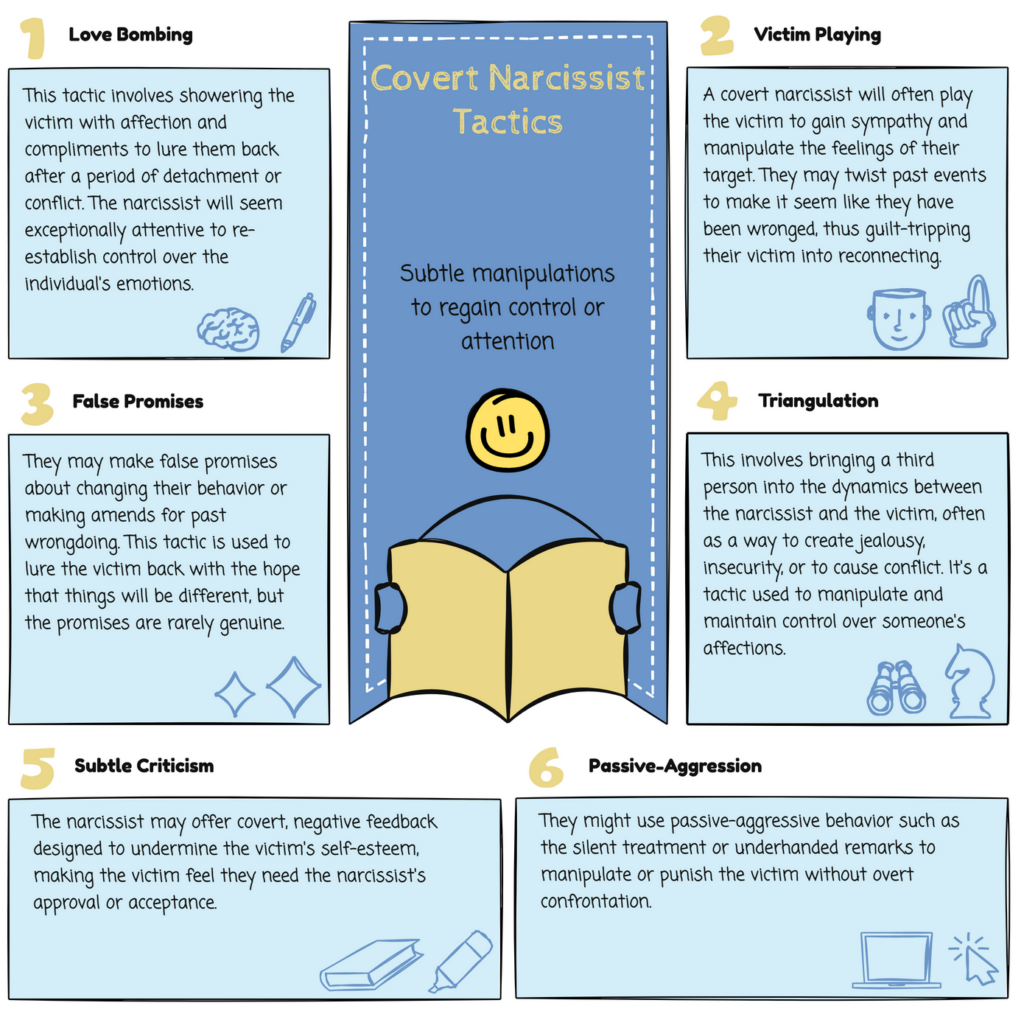Have you ever pondered the complexities and psychological underpinnings of covert narcissist hoovering?
It’s intriguing how individuals can get entangled in manipulative cycles without even realizing it.

Understanding the depths of these tactics can shed light on the dynamics at play in toxic relationships.
Key Takeaways
- Covert narcissists use manipulation tactics like love-bombing and gaslighting to control their targets.
- Recognize signs of covert narcissist hoovering, such as persistent contact and emotional abuse.
- Protect yourself by establishing firm boundaries and seeking emotional support.
- Strategies against hoovering include recognizing manipulation, setting strong boundaries, and prioritizing self-care.
Common Covert Narcissist Hoover Tactics
In covert narcissist hoovering situations, an array of manipulative tactics are commonly deployed to draw targets back into relationships. Covert narcissists skillfully use hoovering tactics like love-bombing and future-faking to make their targets feel desired and secure. By showering them with flattery and grand gestures, they create an emotional pull that can be hard to resist.
Gaslighting, where the narcissist distorts reality to gain control, is another manipulation tactic frequently employed during hoovering. Feigned vulnerability and playing the victim allow covert narcissists to elicit sympathy and manipulate their targets into coming back.
Apologies and displays of remorse are also commonly used by covert narcissists to lure individuals back into relationships. By acknowledging wrongdoing, they aim to make their targets feel valued and understood, thus softening their stance.
Additionally, tactics like isolation, jealousy, and projection are utilized to sow confusion and dependency in the target, further solidifying the narcissist’s hold over the relationship.
Recognizing Hoovering Manipulation

Having understood the common covert narcissist hoovering tactics, our focus now shifts to recognizing the subtle manipulative strategies employed by these individuals. Covert narcissists excel in hoovering attempts to manipulate your emotions, deflecting blame, and using emotional blackmail to regain control and draw you back into the relationship. By recognizing hoovering manipulation, one can better protect themselves from falling prey to emotional abuse.
| Recognizing Hoovering Manipulation | |
|---|---|
| Covert Narcissists Excel | They are adept at playing on your emotions and vulnerabilities to manipulate you. |
| Narcissists Hoovering | Look out for persistent efforts to contact you, especially after periods of silence or when you have tried to establish boundaries. |
| Emotional Abuse | Be wary of any communication that makes you feel guilty, anxious, or obligated to respond, as this could be a form of emotional abuse. |
Signs of Covert Narcissist Hoovering
When observing potential signs of covert narcissist hoovering, it’s crucial to pay attention to subtle shifts in behavior and communication patterns. Recognizing these signs can help individuals break free from manipulative relationships.
Here are three key indicators to look out for:
- Making You Feel Responsible: Covert narcissists often use hoovering techniques to make you feel responsible for their actions or emotions. They may guilt-trip you into rekindling the relationship by portraying themselves as the victim.
- Making You Feel Valued: Hoovering involves tactics aimed at making you doubt your decision to pull away. Narcissists may suddenly show affection, shower you with compliments, or express appreciation to reel you back into their web of manipulation.
- Keeping You Trapped: One common sign of covert narcissist hoovering is the subtle undermining of your confidence and making you doubt your perceptions. This can create a cycle where you feel unable to escape the toxic dynamic, keeping you trapped in their manipulative grasp.
Protecting Yourself From Hoovering

To shield oneself from covert narcissist hoovering, establishing firm boundaries is imperative in safeguarding one’s emotional well-being and autonomy. Covert narcissists employ various hoovering techniques, including guilt-tripping, to maintain power and control over their victims. They may make you feel valued by reminiscing about past good times or manipulate you into feeling responsible for their happiness. This manipulation can lead to making you question your decision to leave the relationship and keep you trapped in a cycle of narcissistic abuse.
| Hoovering Techniques | Description | Impact |
|---|---|---|
| Guilt-Tripping | Using guilt to manipulate and control | Makes victim question their decisions |
| Reminiscing | Recalling good times to lure victim back | Creates a sense of false nostalgia |
| Blaming | Holding victim responsible for problems | Increases self-doubt and dependency |
Recognizing these tactics and seeking emotional support from a therapist or support group are essential for breaking free from the covert narcissist’s influence and protecting yourself from hoovering.
: Does a Covert Narcissist’s Attachment Style Influence Their Hoovering Behavior?
Yes, a covert narcissist’s attachment style can greatly influence their hoovering behavior. Their need for constant validation and fear of abandonment can lead them to manipulate and control their partners to ensure their continued supply of admiration and attention. Understanding their attachment style is crucial in breaking free from their toxic behavior.
Strategies Against Narcissist Hoovering
Implementing a strategic plan to counteract narcissist hoovering involves establishing unwavering boundaries and seeking robust support systems. When dealing with covert narcissists, it's crucial to be aware of their manipulative tactics.
Here are three key strategies to combat narcissist hoovering:
- Recognize the Manipulation: Covert narcissists are skilled at making you feel responsible for their actions and creating a sense of obligation. By understanding their tactics, you can avoid falling into their trap of guilt and manipulation.
- Build Strong Boundaries: Set clear boundaries and stick to them firmly. Narcissists often try to make you feel valued and appreciated to suck you back into their web. By maintaining boundaries, you can protect yourself from their attempts to blame onto you.
- Focus on Self-Care: Prioritize your own well-being and healing. Surround yourself with supportive individuals who can provide emotional reinforcement. Remembering the good times or love bombing can make it difficult to break free, but by focusing on self-care, you can resist their efforts to hoover you back into a toxic cycle.
Frequently Asked Questions
What Triggers a Narcissist to Hoover?
When a narcissist hoovers, triggers can stem from a sense of loss of control, power, or fear of abandonment. Factors like the victim's happiness, success, or independence can provoke this behavior. The narcissist may feel threatened by the victim moving on or finding a new partner, prompting hoovering to maintain a sense of validation and control.
Ego and the need for admiration play a significant role in driving hoovering actions.
What Hurts a Covert Narcissist the Most?
What hurts a covert narcissist the most?
Rejection and criticism are like daggers to their fragile self-esteem. They struggle with facing their flaws and detest being ignored.
The pain of abandonment lingers deeply, exposing their vulnerabilities.
Confrontation with their manipulative ways wounds them profoundly.
These emotional wounds cut to their core, challenging their carefully constructed facade.
What Triggers a Covert Narcissist?
When triggered, covert narcissists often react to threats of losing control or power. These triggers can stem from situations challenging their perceived superiority or questioning their authority.
Such instances can provoke feelings of insecurity or inadequacy, prompting manipulative behaviors to reassert dominance and maintain control over their victims.
Understanding these triggers sheds light on the underlying anxieties and vulnerabilities driving the covert narcissist's toxic patterns of behavior.
How Does a Covert Narcissist Act When Confronted?
When confronted, covert narcissists often resort to manipulation tactics like gaslighting, playing the victim, and deflecting blame. They may deny or distort the truth, making the person doubt their perceptions.
Apologies from covert narcissists are usually insincere, lacking genuine accountability. They may try to isolate the person through jealousy and triangulation. Additionally, they project their faults onto others, flipping blame and causing self-doubt.
Conclusion
In navigating the treacherous waters of covert narcissist hoovering, it's crucial to stay vigilant and protect oneself from being drawn back into a toxic cycle.
Recognizing the signs, understanding the manipulative tactics, and implementing strategies to safeguard against hoovering are key in breaking free from the grasp of a narcissistic individual.
Remember, in this psychological game of cat and mouse, it's essential to stay one step ahead to maintain your emotional well-being.










